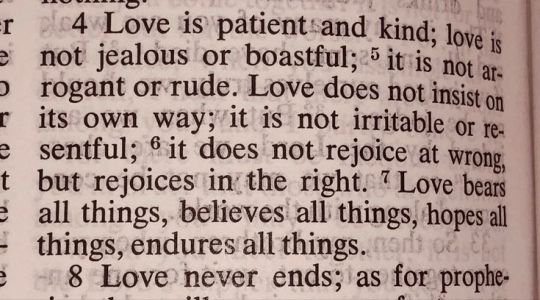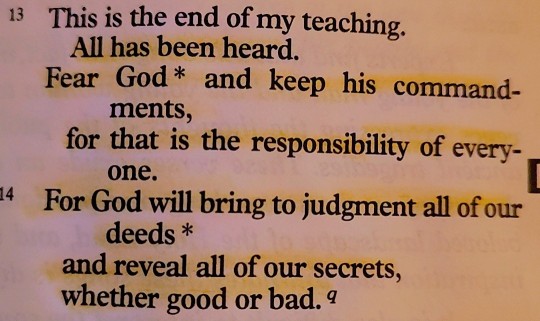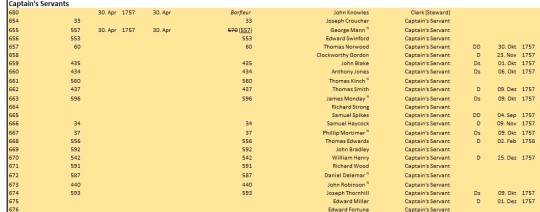#ecclesiastes 12:14
Explore tagged Tumblr posts
Text
For God will bring every deed into judgment, with every secret thing, whether good or evil.
(Ecclesiastes 12:14, ESV)
12 notes
·
View notes
Text

#ecclesiastes 12:14#every work#good and evil#matthew 25:1#ten wives at one wedding#daily bread#nightly bread#god is love#bible
2 notes
·
View notes
Text
Exactly. I think the second to last verse of the entire book of Ecclesiastes sums up everything. Solomon learned.
Let us hear the conclusion of the whole matter:
Fear God and keep His commandments,
For this is man’s all. -Ecclesiastes 12:13
That loving, respecting and obeying God is the key to a fulfilling life. Solomon was blessed with amazing wealth and power by God, that’s true, but he lost focus on what really mattered, God Himself. It wasn’t the riches that mattered, what mattered was listening to and obeying what God says above all else. And at the end of his life, Solomon realized that.
But here’s the good news. Even when we mess up, even when we fall short as Solomon did, even when we let the world get in the way sometimes, God still loves us and is willing to forgive us and help us back to Him. That’s why He sent Jesus down here to dwell among us, to live a perfect life without sin, to show us how to live and love, to die on the cross for us and then rise 3 days later and put death and shame to an end forever. He’s already paid the debt we couldn’t pay, and all we have to do is say yes to Him and His gift of salvation.
We aren’t perfect, only Jesus, only God is, and we can rest in the fact that when we mess up, when we fall short of the glory of God, we can turn to Him and ask for help and forgiveness. He’s always here to listen, to guide us through His Word and the Holy Spirit.
What’s the Point? There once lived a king whose experience exploring and grappling with life’s perplexities was recorded in the book of Ecclesiastes. What’s interesting is that this king—likely King Solomon—reigned in Israel during some of the best years in its history. From the world’s standards, he had more power, prestige, and wealth than any other person before him. Yet, still, he summarized his luxuries with one depressing word: Meaningless! “Everything is meaningless!” (Ecclesiastes 1:2) “Everything is wearisome beyond description.” (Ecclesiastes 1:8) “Nothing under the sun is truly new.” (Ecclesiastes 1:9) “I observed everything going on under the sun, and really, it is all meaningless—like chasing the wind.” (Ecclesiastes 1:14) Though written thousands of years ago, this bleak analysis still resonates with our own restless yearning for more. We want more than meaningless stuff. We want more than surface-level connections and ambitions. We want more than a seemingly thriving, yet secretly unsatisfied life. We want more—but what we want doesn’t typically satisfy us. Like the author of Ecclesiastes, we might find ourselves asking: “What is the point of life?” By the end of the book, “the Teacher” has tried to find meaning in everything under the sun, and he concludes his reflections with these powerful words… “Now all has been heard; here is the conclusion of the matter: Fear God and keep his commandments, for this is the duty of all mankind.” Ecclesiastes 12:13 NIV We can chase after everything this world has to offer and it might bring temporary pleasure. But in the end, pursuing those things apart from God will always leave us empty. The great news is, there’s a God in heaven who created and loves us, and He understands what we really need. He knows that life is best when we follow His design for life. He is worthy of our awe, our honor, and our worship. So, fear God and keep His commandments. Love Him with everything in you and love your neighbor as yourself. That is the point. Only then will life no longer be meaningless.
#Ecclesiastes 12:14#obey God above all else#christianity#christian faith#christian things#christian encouragement
4 notes
·
View notes
Text

Ecclesiastes 7:12-14 (NASB1995) - For wisdom is protection just as money is protection, But the advantage of knowledge is that wisdom preserves the lives of its possessors. Consider the work of God, For who is able to straighten what He has bent? In the day of prosperity be happy, But in the day of adversity consider— God has made the one as well as the other So that man will not discover anything that will be after him.
23 notes
·
View notes
Text
"THERE'S DANGER IN TWISTING SCRIPTURE!"
Deuteronomy 4:2, “Now listen, Israel, listen carefully to the rules and regulations that I am teaching you to follow so that you may live and enter and take possession of the land that God, the God-of-Your-Fathers, is giving to you. DON’T ADD A WORD TO WHAT I COMMAND YOU, AND DON’T REMOVE A WORD FROM IT. Keep the commands of God, your God, that I am commanding you.” (MSG) Ecclesiastes 3:14-15,…

View On WordPress
#1 Corinthians 4:20#1 Samuel 13:14#2 Samuel 12:7-10#Believers#Bible#Chef Shermaine#Church#Danger#Deuteronomy 4:2#Ecclesiastes 3:14-15#Encouragement#Faith#God#Holy Spirit#Jesus Christ#Revelation 22:18-19#Scripture#Word of God
6 notes
·
View notes
Text
A Bonfire of Vanity: Advice From the Wisest Man Who Ever Lived
Tom Wolfe (who wrote, “The Bonfire of the Vanities”) said, “The surest cure for vanity is loneliness.” Another person who understood vanity was (an older and somewhat jaded) King Solomon. After living a life of wealth and achievement, and after marrying hundreds of wives and keeping dozens of concubines, he wrote this: “Now all has been heard; here is the conclusion of the matter: Fear God and…

View On WordPress
#1 Kings 10:23-24#1 Kings 10:6-8#2 Chronicles 1:7#Ecclesiastes 12:13-14#Madonna#Matthew 12:36#Matthew 6:33#Romans 14:12#Solomon#Tom Wolfe#vanity
1 note
·
View note
Text
On Bended Knees and Hearts
Sept 23, 1968: It is a day of celebration. We are with our beloved maternal grandma. The little girl (me) happily stands near her beautiful baby sister who carries an infectious smile. We are celebrating my sister’s two-year-old birthday. Oct. 22, 1968: One month later, it is a day of mourning. We are devastated, and heartbroken about the precious life taken much too soon by a hit-and-run…

View On WordPress
#baby sister#celebration#Ecclesiastes 12:7#grieving#heartfelt#heaven#John 14#Life & Death#Mama#Mother#mourning#personal
0 notes
Text
how to read the Bible

this is in order!
1. John
2. Mark
3. Matthew
4. Luke
5. Genesis
6. Exodus
7. Leviticus
8. Numbers
9. Dueteronomy
10. Romans
11. Galatians
12. Colossians
13. Proverbs
14. Ecclesiastes
15. Job
16. 1 Peter
17. 1 Corinthians
18. 2 Corinthians
19. Ephesians
20. Philippians
21. 1 Thessalonians
22. 2 Thessalonians
23. 1 Timothy
24. 2 Timothy
25. James
26. 2 Peter
27. 1 John
28. 2 John
29. 3 John
30. Jude
31. Psalms
32. Joshua
33. Judges
34. 1 Samuel
35. 2 Samuel
36. 1 Kings
37. 2 Kings
38. 1 Chronicles
39. 2 Chronicles
40. Ezra
41. Nehemiah
42. Jeremiah
43. Lamentations
44. Ezekiel
45. Joel
46. Amos
47. Obadiah
48. Nahum
49. Habakkuk
50. Zephaniah
51. Haggai
52. Zechariah
53. Malachi
54. Micah
55. Hosea
56. Luke
57. Esther
58. Jonah
59. Song of Solomon
60. Acts
61. Titus
62. Philemon
63. Hebrew
64. Isaiah
65. Daniel
66. Revelation
102 notes
·
View notes
Text






— [Again and again, even though we know love’s landscape], Rainer Maria Rilke (trans. Edward Snow)
Ecclesiastes 1:9 by WolfSpider

Hockey Poetry Post ?/?
img. links: 1, 2, 3, 4, 5, 6, 7, 8, 9, 10, 11, 12, 13, 14, 15, 16, 17, 18, 19, 20, 21
#fic rec#I found out about this ship yesterday and now its all I can think about so..#bon appetit#everyone go read this fic its incredible I love it v much#brock faber#jonas brodin#minnesota wild#hockey poetry posts
85 notes
·
View notes
Text

Approaching God with Awe
1 Guard your steps when you go to the house of God. Draw near to listen rather than to offer the sacrifice of fools, who do not know that they do wrong. 2 Do not be quick to speak, and do not be hasty in your heart to utter a word before God. After all, God is in heaven and you are on earth. So let your words be few.
3 As a dream comes through many cares, so the speech of a fool comes with many words.
4 When you make a vow to God, do not delay in fulfilling it, because He takes no pleasure in fools. Fulfill your vow. 5 It is better not to vow than to make a vow and not fulfill it.
6 Do not let your mouth cause your flesh to sin, and do not tell the messengera that your vow was a mistake. Why should God be angry with your words and destroy the work of your hands? 7 For as many dreams bring futility, so do many words. Therefore, fear God.
The Futility of Wealth (Psalm 49:1–20)
8 If you see the oppression of the poor and the denial of justice and righteousness in the province, do not be astonished at the matter; for one official is watched by a superior, and others higher still are over them. 9 The produce of the earth is taken by all; the king himself profits from the fields.
10 He who loves money is never satisfied by money, and he who loves wealth is never satisfied by income. This too is futile. 11 When good things increase, so do those who consume them; what then is the profit to the owner, except to behold them with his eyes?
12 The sleep of the worker is sweet, whether he eats little or much, but the abundance of the rich man permits him no sleep.
13 There is a grievous evil I have seen under the sun: wealth hoarded to the harm of its owner, 14 or wealth lost in a failed venture, so when that man has a son there is nothing to pass on.
15 As a man came from his mother’s womb, so he will depart again, naked as he arrived. He takes nothing for his labor to carry in his hands. 16 This too is a grievous evil: Exactly as a man is born, so he will depart. What does he gain as he toils for the wind? 17 Moreover, all his days he eats in darkness, with much sorrow, sickness, and anger.
18 Here is what I have seen to be good and fitting: to eat and drink, and to find satisfaction in all the labor one does under the sun during the few days of life that God has given him—for this is his lot.
19 Furthermore, God has given riches and wealth to every man, and He has enabled him to enjoy them, to accept his lot, and to rejoice in his labor. This is a gift from God. 20 For a man seldom considers the days of his life, because God keeps him occupied with the joy of his heart. — Ecclesiastes 5 | Berean Standard Bible (BSB) The Berean Study Bible (BSB) © 2016, 2018 by Bible Hub and Berean Bible. All rights Reserved. Cross References: Exodus 3:5; Exodus 23:25; Exodus 30:18; Leviticus 4:2; Leviticus 4:22; Numbers 30:2; Deuteronomy 12:7; Deuteronomy 12:18; Deuteronomy 23:21; Judges 11:35; 2 Chronicles 1:12; Job 1:21; Job 11:2; Job 20:20; Psalm 39:6; Psalm 127:2; Proverbs 3:24; Proverbs 10:19; Proverbs 15:2; Proverbs 22:16; Ecclesiastes 1:3; Ecclesiastes 1:8; Ecclesiastes 2:9,10 and 11; Ecclesiastes 2:23; Ecclesiastes 3:13-14; Ecclesiastes 6:1-2; Ecclesiastes 7:18; Matthew 6:7; Acts 5:4; 1 Corinthians 16:16; 1 Timothy 6:7; 1 Peter 4:12
Ecclesiastes 5 Bible Commentary - Matthew Henry (concise)
Key Passages in Ecclesiastes 5
1. vanities in divine service 8. in murmuring against oppression 9. and in riches 18. Joy in riches is the gift of God.
#reverence#God#approach#justice#righteousness#wealth#futility#Ecclesiastes 5#Book of Ecclesiastes#Old Testament#BSB#Berean Standard Bible#Bible Hub
11 notes
·
View notes
Text
For God will bring every deed into judgment, with every secret thing, whether good or evil.
(Ecclesiastes 12:14, ESV)
5 notes
·
View notes
Text

#ecclesiastes 12:14#final fantasy 10#fear god#keep his commandments#the conclusion#daily bread#nightly bread#god is love#bible
0 notes
Text


Paring, Ecclesiastes 12:13-14 with Romans 2:6.
What are you seeking? Are your actions day-to-day representing glory and honor?
Let us all try our best to represent and serve our Lord Jesus Christ!! ❤️
#scripture#bible scripture#bible verse#bible study#ecclesiastes#faith in jesus#jesus#jesus loves you#jesus christ#jesussaves#something to think about
8 notes
·
View notes
Text
Midshipman Juba Fortune
Here's a nice little thing I don't want to keep from you.
From 1613 onwards, so-called "clandestine fleet marriages" increasingly took place in the somewhat unusual surroundings of Fleet Prison in London. English marriage law was only precisely fixed by an Act of 1753 ("Lord Hardwicke's Marriage Act"). In the previous legal uncertainty regarding the formation of valid marriages ("common-law marriages" had been legal until then), a brisk marriage business developed in Fleet Prison and the surrounding area in the 17th and early 18th centuries. This was because prisons could claim to be outside ecclesiastical jurisdiction and so made it possible to marry in secret. But what exactly was meant by a secret marriage? A secret marriage could come about because the groom was not yet 21 years old (i.e. of age), the bride was pregnant or her parents did not consent, or the groom was not in a position to pay the marriage tax. The advantage of such marriages was that they could be entered into without the consent of the parents, without witnesses or even a certificate of residence. However, children were also allowed to marry, as the minimum age was 14 for the groom and 12 for the bride. Due to these circumstances, these marriages were very favourable and were considered legal, even if clandestine.
During the 1740s, some 6,000 of the 47,000 annual English marriages were performed in the Fleet area alone.
But let us now turn to such a secret marriage. On board HMS Invincible in 1757 (one year after she sank) was a young man named Juba Fortune, Mishipman, born in the East Indies in 1713.

HMS Invincible’s muster roll, by Brent Piniuta (x)
Also on this muster roll is Edward Fortune, Captains Servant born 3 September 1738 in Marylebone, London. Interestingly, Juba married Elizabeth Howell of London in a secret wedding ceremony in Fleet Prison on 27 July 1738, and Edward appears to be their son and revealed the reason for their quickly secret marriage.

What happened to them after the sinking of HMS Invincible is not known, so they are not listed. It is possible that they were no longer at sea after that.
If this is indeed a case of father and son, then this would also be an interesting matter for other pattern roles and could by all means point to other secret marriages and family connections. Which in turn should be kept in mind for further research in the field of muster rolls.
#naval history#juba fortune#midshipman#persons of the navy#mid 18th century#age of sail#midshipman monday
103 notes
·
View notes
Text

“Hailed as the wisest King in history, we might question that, just based on his 1000 wives story!
But it’s a tender story, this King Solomon.
His father, the adored King David, had made one of his greatest mistakes.
He had committed adultery and had the woman’s husband killed.
Not a bright shining moment for anyone, let alone a king. A child was born from that adultery and little Daniel died. Solomon was born next.
Scripture says something about Solomon, it doesn’t say about any other baby.
…..”She bore a son, and called his name Solomon; and the Lord loved him.” (2 Samuel 12:24b)
Solomon is a derivative of the Hebrew word “Shalom” which means Peace.
God had said Solomon would be a man of peace, so he could build the Temple.
A place of God’s Presence.
While we may see our spiritual life as warfare here, let is always be mindful that the Presence of God is Peace.
Solomon was so special to God, that God sent a word to his parents that His nickname for Solomon was “Jedidiah” which means: “Beloved of the Lord”. Isn’t that beautiful?
Solomon was incredibly wise, unbelievably wealthy, and did remarkable things for his country. He was admired and respected
far beyond his kingdom. He wrote like his father, so we have many songs and proverbs from him, a book about life, and even a book on spiritual romance.
He did complete a fine palace for him and those wives, and of course, he built that glorious Temple. He reigned 40 years and actually died quite young at 55 years old.
But Solomon’s greatest battle as a man of peace, was the very thing God specifically warned him about early on.
Unbelieving ungodly wives.
God still tells us not to be unequally yoked. A Believer must marry a Believer.
That is still Scriptural today:
“Do not be unequally yoked together with unbelievers: for what fellowship does righteousness with unrighteousness? and what communion hath light with darkness?” (2 Corinthians 6:13)
But like many people, Solomon did not obey God in that area of his life.
You can tell from his proverbs he learned a lot from those experiences.
While I believe Solomon left God for a season, I believe he’s also in heaven today, because of the last verse in his book, Ecclesiastes 12:13-14:
“This is the end of the matter; all hath been heard: Fear God, and keep His commandments; for this is the whole duty of man. For God will bring every work into judgment, with every hidden thing, whether it be good, or whether it be evil.”
He concluded his book with full recognition of understanding the fear of God, that he would answer to God.
Solomon teaches all of us that no matter how wise, wealthy, or powerful
we may be, we can still make major mistakes in our personal devotion to Christ. We can still choose things and people who will take us away from God. We can still want the excess of sin. Maybe it’s not in every area of our lives, but maybe in one. Maybe it’s secret. Maybe it went viral.
Because God loved Solomon so much, I believe God loves us so much. No matter where we fail Him, and we all have our places, He still waits for us to recognize thd truth.
No matter where our greatest place of learning may be, God still desires the beauty of holiness, purity and purpose.
The sin I battle most, might not be an issue for you at all. What tempts you, may not be a glimpse for me. But we have to look at each other with grace and love, knowing God’s purpose for us all, is bigger than our sin.
Even though Solomon was very wise, he still made stupid mistakes. Remember that, when you want to hate yourself or somebody else for that really dumb sin.
It’s not wisdom or wealth or position that keep us from falling into sin. It’s our walk with God. Our remaining in Christ.
We all may struggle remaining at times. We can’t hate another person, just because their sin is different than ours. God perfects that which concerns us,
is what He says. We don’t have to do the perfecting of each other.
To know Christ and make Him known gives us a purpose like no other. May we live with grace and purpose, firmly remaining in Christ.”
~AnnStewartPorter
10 notes
·
View notes
Note
How do I go about confessing my sins? It just always confuses me that Jesus sacrificed himself for our sins so that we are forgiven or can be forgiven? If we are already forgiven then why do we need to keep repenting when we unwillingly commit sins such as cursing when emotionally frustrating or doing things out of temper ... or if jesus is the reason why we can be forgiven then we wouldn't be forgiven no matter what if it werent for jesus? What about the people that existed prior to Jesus being born?
Your questions are many and I will try to break them each down simply and supportive with Scripture. Bear with me.
i. You pray to God and confess your sins, tell Him what you have done and ask for His forgiveness. When we sin, we sin against a Holy God and we don't feel right, there is a lack of peace and fellowship with God it can feel like (Ephesians 4:30, grieving the Spirit it's referred to for believers); it is a good thing if we cannot rest in our sin and have peace living in sin, because the Holy Spirit indwells the believer (Ephesians 4:30, 1 Corinthians 6:19). If we feel no guilt when sinning, we keep on and see no wrong and justify it, it would seem we are not saved because how can we love/rejoice in what God hates (John 14, 1 John 2, 1 Corinthians 11:32, Hebrews 12:8). There should be a "war", if you will, within a believer of sin and not having peace living in sin. We live in victory and not defeat, because Christ paid the cost, but we don't go on willfully sinning (Romans 6). We all sin and fall short of the glory of God (Romans 3:23), but we don't stay there. We still sin (1 John 1), but a believer will not want to be enslaved to sin. It will bother a believer; that is the Holy Spirit conviction. This is a good thing! Sanctification is a process and it is a good thing to be convicted of sin and freeing to confess it to our Holy God who loves us.
ii. Yes, Jesus died on the cross for our sins. He paid the cost that we may no longer be guilty.
"When we accept Jesus as our Savior, we receive salvation and forgiveness. But that’s not all. The Bible says we also receive justification, redemption, reconciliation, atonement, propitiation, and regeneration. Each of these theological terms expresses wonderful truths about the blessing we receive when Jesus becomes our Savior. Salvation and forgiveness, while related, are not exactly the same. The term salvation comes from the Greek word sozo, which means 'to be delivered, rescued.' Salvation is deliverance from the penalty of sin, that is, eternal separation from God (Romans 6:23; Matthew 25:46). Salvation is God’s rescuing us from our deserved fate. Salvation also includes a more immediate deliverance from the power of sin in this life. Sin has lost its dominion over the saved ones (Romans 6:14). Faith in Jesus Christ rescues us from the empty and meaningless life described in Ecclesiastes and provides us with a life that is abundant and fruitful (John 10:10; Galatians 5:22–23). The term forgiveness comes from the Greek word aphiemi, which means 'to let go, to give up, to keep no longer.' When Jesus forgives us, our sins, trespasses, iniquities, and transgressions are erased, wiped off the record. Forgiveness of sin is analogous to financial debt being erased. When God forgives us of our sins, we are free. Our sins are wiped out. God will never hold them against us (Psalm 103:12). Salvation and forgiveness are closely related. There is no salvation without forgiveness. Salvation is God’s delivering us from the consequences of sin. Forgiveness is God’s erasing our sin debt. To use a financial illustration, forgiveness is God’s shredding the documents that list our debt, and salvation is God’s letting us out of debtors��� prison. Praise God for the wonderful salvation and forgiveness He has provided. May our lives reflect gratitude for all He has done for us (Romans 12:1)." Source
iii. I'm unsure I understand your full question, but apart from receiving Jesus as our Savior (the propitiation of our sins) there is no forgiveness. There is no other Way (John 14:6). We can never be good enough, keep the law perfectly, achieve nirvana, pay the debt, whatever you want to call it. Salvation, forgiveness, peace only comes through Jesus Christ. And this new life (being born again in Scripture; see John 3:6-7) will bring forth a new life in you; you will be set apart (sanctification; see 2 Timothy 2). "Work at living in peace with everyone, and work at living a holy life, for those who are not holy will not see the Lord." Hebrews 12:14. We are saved by grace alone through faith alone–"For it is by grace you have been saved through faith, and this not from yourselves; it is the gift of God, not by works, so that no one can boast" Ephesians 2:8-9. Our faith, however, will show forth a new life/being born again/sanctification- there will be fruit, where there is no fruit there is no new life. "Faith by itself, if it does not result in action, is dead." James 2:18; "He cuts off every branch of Mine that doesn’t produce fruit, and He prunes the branches that do bear fruit so they will produce even more." John 15:2.
iv. See https://www.gotquestions.org/Old-Testament-salvation.html
9 notes
·
View notes